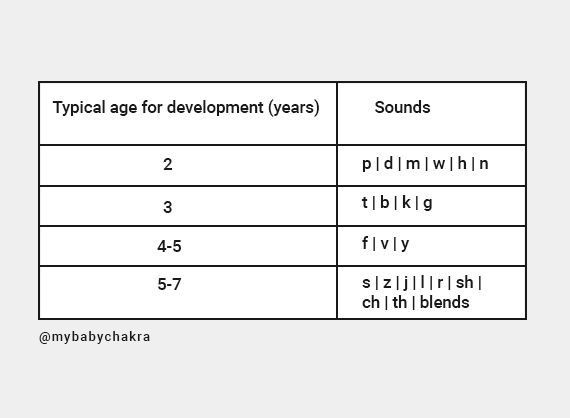By Merzia Maskati
Yes, we all know that each child is unique and may reach their developmental milestones at different times. Yet for every developmental assessment, we must know the red flags too.
Don't take your child's babbling and cooing for granted - they are milestones too, and indicate multiple abilities. As a parent, you need to be watchful about the following speech development milestones in your child. If you do not observe them you must see a specialized speech therapist.
1. What kind of sounds should your child be able to articulate?
![2016-03-14-1457973931-7232728-d.jpg]()
2. How fluently is your child speaking?
Observe any hesitation or resistance in their flow of speech, for example: "mm-mm-mama" instead of "mama".
3. Your child should be able to speak appropriately as per her age
You may want to refer to this table of typical infant and toddler language development milestones for a better understanding. (Data Courtesy: American Speech and Hearing Association)
![2016-03-14-1457974013-3837704-B.jpg]()
![2016-03-14-1457974073-7696750-46.jpg]()
![2016-03-14-1457974906-94041-712.jpg]()
![2016-03-14-1457974338-7962600-12.jpg]()
![2016-03-14-1457974392-9998252-23.jpg]()
![2016-03-14-1457974144-1862286-34.jpg]()
![2016-03-14-1457974569-3339078-45.jpg]()
4. Voice quality
Believe it or not, voice too is something that can be worked upon. You can seek an intervention in case you sense an issue with voice quality, for example if it is hoarse, nasal or off pitch (high or low).
5. Feeding issues
Mothers are often worried that the child doesn't eat properly.
If you notice symptoms such as aversion to foods, trouble in chewing, holding their food for too long in their mouth or gagging, you need to see a speech therapist.
Speech therapy can begin as early as 12 months of age for communication skills, if the milestones have not been met. For feeding or swallowing issues, intervention can start as early as a few weeks to a month of birth.
It is advisable that you don't wait for your child to "outgrow" his/her speech issue and consult a therapist once you perceive a problem. Research has shown that children with untreated speech and language difficulties are at a higher risk of learning difficulties in school.
Better safe than sorry!
Merzia Maskati is the founder of the Speech Dysphagia and Learning Clinic (SDLC). Merzia specializes in paediatric speech disorders, and on feeding and swallowing difficulties. She has been instrumental in organizing the first ever "Modified Barium Swallow Study" in Mumbai, and has certified several ASHA interns and clinical fellows.
![]() Like Us On Facebook |
Like Us On Facebook |
![]() Follow Us On Twitter |
Follow Us On Twitter |
![]() Contact HuffPost India
Contact HuffPost India
Also see on HuffPost:
Yes, we all know that each child is unique and may reach their developmental milestones at different times. Yet for every developmental assessment, we must know the red flags too.
Don't take your child's babbling and cooing for granted - they are milestones too, and indicate multiple abilities. As a parent, you need to be watchful about the following speech development milestones in your child. If you do not observe them you must see a specialized speech therapist.
1. What kind of sounds should your child be able to articulate?

2. How fluently is your child speaking?
Observe any hesitation or resistance in their flow of speech, for example: "mm-mm-mama" instead of "mama".
3. Your child should be able to speak appropriately as per her age
You may want to refer to this table of typical infant and toddler language development milestones for a better understanding. (Data Courtesy: American Speech and Hearing Association)







4. Voice quality
Believe it or not, voice too is something that can be worked upon. You can seek an intervention in case you sense an issue with voice quality, for example if it is hoarse, nasal or off pitch (high or low).
5. Feeding issues
Mothers are often worried that the child doesn't eat properly.
If you notice symptoms such as aversion to foods, trouble in chewing, holding their food for too long in their mouth or gagging, you need to see a speech therapist.
Speech therapy can begin as early as 12 months of age for communication skills, if the milestones have not been met. For feeding or swallowing issues, intervention can start as early as a few weeks to a month of birth.
It is advisable that you don't wait for your child to "outgrow" his/her speech issue and consult a therapist once you perceive a problem. Research has shown that children with untreated speech and language difficulties are at a higher risk of learning difficulties in school.
Better safe than sorry!
Merzia Maskati is the founder of the Speech Dysphagia and Learning Clinic (SDLC). Merzia specializes in paediatric speech disorders, and on feeding and swallowing difficulties. She has been instrumental in organizing the first ever "Modified Barium Swallow Study" in Mumbai, and has certified several ASHA interns and clinical fellows.
 Like Us On Facebook |
Like Us On Facebook |  Follow Us On Twitter |
Follow Us On Twitter | Also see on HuffPost: